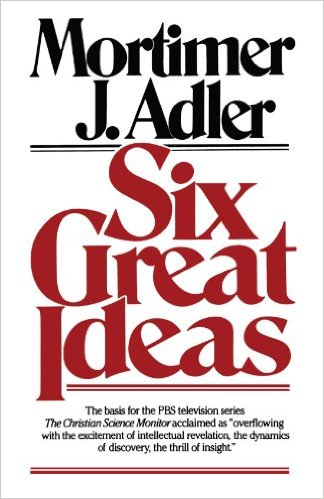|
Word Gems
exploring self-realization, sacred personhood, and full humanity
Dr. Mortimer J. Adler's
Six Great Ideas
|
The Freedom to Do as One Pleases, Part I: the Three Forms of Freedom
|
return to 'Six Great Ideas' main-page

|
Editor's note:
Excerpts from Six Great Ideas are offered below, indented format; plus, at times, my own commentary.
|
The Freedom to Do as One Pleases
Like most other great ideas, liberty is not without its inner
complexity. We have found that there are different kinds of
truth, different modes of goodness, different senses of beauty.
So, too, in the case of liberty or freedom. The two words are
completely interchangeable. There are three major forms of freedom.
The first is a freedom that is inherent in human nature. We are born with it in our possession. It is distinctive of human beings, just as rational orconceptual thought and syntactical speech are distinctiveof human beings. It is, therefore, appropriate to speak of it as a natural freedom, thus referring to the way in which we possess it.
The second major kind of liberty is the liberty that is associ-
ated with wisdom and moral virtue. It is possessed only by
those who, in the course of their personal development, have
acquired some measure of virtue and wisdom. Thus possessed,
it is appropriately designated as an acquired freedom.
The third of the major forms of freedom is completely depen-
dent on favorable external circumstances. An individual's pos-
session of it may vary from time to time and from place to place,
depending on whether external circumstances favorable or un-
favorable to its exercise are present. Individuals may possess it
or be deprived of it in varying degrees, which is certainly not
the case with natural or acquired freedom. The appropriate
way to designate this liberty is to speak of it as circumstantial
freedom.
Described so far in terms of the way in which we possess
them, what do these three forms of freedom or kinds of liberty
consist in?
Our natural freedom consists in freedom of the will. It is
freedom of choice—the liberty of being able to choose other-
wise than as we did. Having such freedom, our actions are not
instinctively determined or completely conditioned by the im-
pact of external circumstances on our development, as is the
case in the behavior of other animals. With this innate power
of free choice, each human being is able to change his own
character creatively by deciding for himself what he shall do or
shall become. We are free to make ourselves whatever we
choose to be.
Our acquired liberty, which is sometimes called "moral free-
dom," consists in our having a will that is habitually disposed
by virtue to will as it ought. Virtue, as we have already seen, is
the habitual disposition to desire aright, which means choosing
what one needs—the real goods one ought to desire. The obsta-
cles or impediments to right desire stem from appetites or pas-
sions that generate wants in conflict with needs, wants that
tempt or solicit us to make the wrong rather than the right
choices.
Human bondage, according to Spinoza, is our enslavement
by such appetites or passions—our lower nature. Human free-
dom—moral liberty—lies in reason's control of the passions,
made firm by moral virtue, the acquired habitual disposition to
make right rather than wrong choices.
The freedom to will or choose as one ought could not be
acquired by human beings if they did not antecedently possess,
as an inherent property of human nature, a free will and the
power of free choice. If we cannot choose otherwise, how can
we be morally responsible for choosing aright rather than yield-
ing to the seductions of pleasure or lust? And if we cannot be
held morally responsible for the choices we make, what justifi-
cation can there be for the praise or blame we accord an indi-
vidual for his or her character or conduct?
Our circumstantial freedom consists in our being able to do
as we please—our ability to carry out in overt action the deci-
sions we have reached, to do as we wish for our individual
good as we see it, rightly or wrongly.
|
